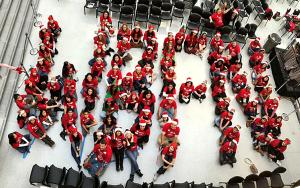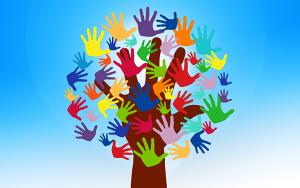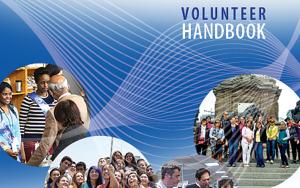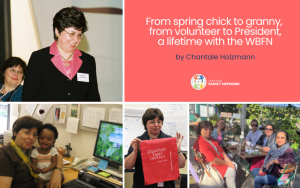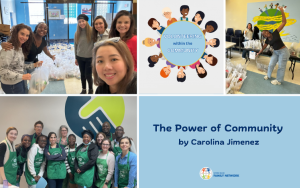Hada Zaidan Mosaic marks October, National Domestic Violence Month, and reports progress to date in help for World Bank Group (WBG) families and staff. Myra Jacobs, a member of the WBFN Domestic Abuse Task Force, conducted the following interview with Hada Zaidan, the new HRS Service Center (HRSSC) Domestic Abuse Coordinator.
In the October Mosaic last year we wrote that years-long advocacy by WBFN for the Bank to address domestic abuse (DA) in the workforce had begun to yield fruit. WBFN had recommended adoption of specific policies and procedures, and a specialized system of assistance for victims. Top management gave the go-ahead for refining and implementing the necessary steps. Please outline progress so far.
I’m happy to say that HRSSC, under Mark Bowyer’s stewardship, has so much more to offer our families caught in abusive situations than was the case a year ago. The most tangible development is that ince February we have been able to rely on the “HUB”. The Bank provides this external, confidential, professional help service through a contract with Cope Inc, the same company that provides the Family onsultation Service (FCS). [FCS provides confidential counseling for WBFN members having personal concerns]. The HUB provides particular expertise with DA situations 24/7, but unlike FCS, is available to staff members as well as the family.
In an ongoing process with Cope, our DA Network [a close collaboration between HR, WBFN, the Staff Association, and several Bank units including the Counseling and Consultation Service —now the Personal and Work Stress Counseling Unit, Benefits, Security, Ethics and Legal among others] has defined the most appropriate ways to help our victims. Special features of the HUB are that the caller’s needs are identified at the outset. This is in order that she/he can best be counseled and / or referred for help. The scope of the HUB’s assistance for DA cases includes crisis help, safety and welfare of adults as well as children, physical and mental health, accommodation, legal/immigration status, and so on. The HUB also provides confidential referrals for abusers who seek help in changing their behavior.
Moreover, the HUB provides DA “case-management” where multiple issues need to be pursued at the same time. This type of coordination is invaluable for victims in fearful, confusing situations.
The HUB functions as a liaison between the client, community resources, and the WBG.
Those with concerns that may be DA-related should contact the HUB directly by calling 202-628-2288.
What role does the HR DA Coordinator play?
The case-management provided by the HUB makes it possible for victims’ concerns to be conveyed to, and addressed by the Bank in a confidential, rational and effective manner. My position as DA Coordinator is to be the link between external DA activities such as the HUB, and the WBG’s own efforts relating to DA in the workforce. The latter include other aspects of our DA response, such as education and outreach, and oversight over the program.
In these areas too, there has been much progress in the past year. We have held several DA awareness-raising sessions for HR staff. Our informational materials have been updated and will soon replace current hardcopy versions available onsite and through WBFN, and will be posted on the Bank’s Intranet. Through these initiatives we hope to improve understanding and dispel misapprehensions about DA. Monitoring and evaluation mechanisms for all important aspects of our response are under development. These will help ensure that Bank efforts to reduce harm to our families from DA are effective and fair.
I myself report to Geremie Sawadogo, Manager Global Mobility & Work-Life Services, who has chaired our DA Network since he joined the Bank last spring. From the start Geremie has demonstrated his sensitivity to the issue of DA. He is committed to carrying out the comprehensive DA response outlined by WBFN, and approved by HR management last Fall.
Speaking as a former WBFN president, the warm partnership the Work-Life unit enjoys with WBFN is a source of pride and pleasure to me. I am grateful to have been able to draw on the support and expertise of the current and past leadership in meeting the challenges of the DA program.
Finding affordable expert legal advice and representation is almost always a problem for the WBG DA victims. How does the HUB help in this area?
This is an important issue. We have maintained the firm view that it is up to the courts to decide whether a given situation is one of DA, as defined in US law. Neither HR nor the HUB makes that judgment.
To enable victims to properly make their case in court, the DA Network has devoted considerable attention to finding ways to narrow the gap between the legal resources most alleged abusers are able to summon, and those accessible to their victims. Several approaches have been devised.
First, where appropriate, the HUB helps clients identify the various legal options available for obtaining protection and support, using written guidelines specially prepared by a local legal firm. In especially complex cases e.g. where the family’s visa status is a complicating factor, the HUB may arrange for one free consultation with a lawyer with whom the WBG has contracted.
Second, the HUB is knowledgeable about the process for seeking a protection order in our local jurisdictions, and can offer practical guidance to victims in preparing themselves for the court
appearance. In addition, the HUB can refer to community listings of DV lawyers willing to work pro bono.
Third, in addition, those HUB clients who have already obtained a temporary protection order, which is effective for only a week or two, and who are proceeding with a petition for a civil protection order, which remains in effect for much longer, may qualify for some limited financial help to engage a lawyer.
Fourth, difficulties for WBG victims may arise because their lawyers are unfamiliar with the employment conditions of the international organizations, and/or the G-4 visa context. We are fortunate that our Legal Assistance Officer, who is part of the DA Network, is available to inform lawyers representing HUB clients on relevant WBG-specific issues. We are optimistic that this technical assistance will lead to more rapid, and fairer resolution of DA situations involving our families.
What challenges remain?
During the past year the Bank has sent signals that DA is not consistent with the standards of behavior expected from its staff. First, help to victims, and referrals for abusers, have been made available through The HUB. Second, Staff Rules 2.01 and 8.01 were revised last winter. SR 2.01 makes it easier for Work-Life Services and WBFN to make contact with incoming spouses/registered domestic partners who might otherwise remain isolated. It also grants spouses/registered domestic partners access to benefits information. SR 8.01 specifically mentions DA offences among those that may warrant disciplinary action. These developments represent an enormous collaborative effort on the part of many units/individuals. I wish to take this opportunity to recognize and thank all those who contributed towards these achievements.
At the moment, the Code of Professional Ethics, “Living our Values”, is being expanded to include conduct towards family members, to harmonize with the Bank’s core values and ethical standards.
I look forward to the completion of this process, as the Code is a crucial element in helping staff to fully appreciate the Bank’s support for family life. In this connection, I would like to congratulate the WBFN DA Task Force on having been recognized by the Ethics Unit in June! [WBFN received an Award for its efforts to enhance the ethical work environment by advocating for a program that includes changes to the Code of Ethics, in order to address workforce DA.
However, our biggest challenge is adequate resources. The program must become a funded mandate to ensure its survival first and foremost and second to expand the educational awareness training beyond their current scope to reach all staff and family members. Only through education can we make a serious impact on the sadly universal problem of domestic abuse.
Chantale Holzmann, Myra Jacobs, Lois Khairallah, Rosa Lia Troch
The WBFN Domestic Abuse Task Force

